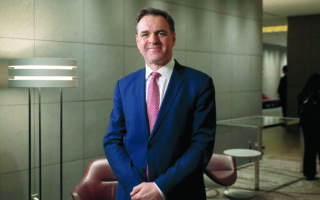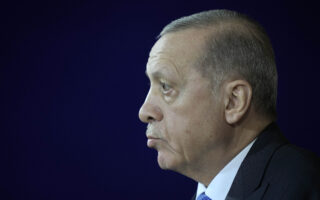ND’s losses are from ‘both sides,’ defense minister tells Kathimerini
Ruling conservatives need to listen to grassroots supporters, the ‘soul’ of the party, without losing sight of the ‘middle ground,’ says Dendias

The losses suffered by ruling New Democracy in the recent European Parliament elections were from “both sides,” Defense Minister Nikos Dendias tells Kathimerini, noting that while these losses were mostly concentrated in the center, the ones to the right were “not negligible” either.
Dendias stresses the importance of ND not losing sight of the “middle ground” and also of having a concerted strategy in response to “whatever developments may take place in the center-left.” The crisis in the center-left, he adds, however, is not to the conservatives’ benefit.
On the matter of next year’s presidential election, Dendias says Prime Minister Kyriakos Mitsotakis will “evaluate all the different variables before making his final recommendation.”
With regard to Greek-Turkish relations, the former foreign affairs minister says that there can be no room for complacency as long as unresolved disputes remain between the two sides, while on the matter of Greece’s defense program, he heralds a study for the acquisition of new submarines and notes that the Hellenic Navy upgrade includes, apart from the three FDI frigates, pushing ahead with the Constellation program and participating in the European corvette scheme.
What, in your opinion, was the political message from the June 9 European elections and how worried should the government be? Was the loss of support due, for example, to the legalization of same-sex marriage or runaway prices? Or was it because of how other areas are being managed?
Many different elements that contributed to the result, with those you mention being among them. The prime minister himself has acknowledged, for example, that on the matter of prices, despite the efforts that have already been made, citizens expect interventions in the operation of the market and greater emphasis on improving disposable income. We mustn’t forget that New Democracy is a big people’s party. As such, it treats all issues related to social cohesion seriously and with empathy for citizens’ concerns. Let’s not forget that the abstention rate was very high, with nearly six in 10 eligible voters choosing not to participate in the electoral process. It is an observation that ought to trouble the political system as a whole, not just New Democracy. The fact that so many citizens were not convinced of the need to participate in the elections, at such a critical juncture for Europe, is extremely alarming. On the other hand, we mustn’t exaggerate when it comes to assessing the result, but look at the facts rationally. The government maintains its lead as citizens’ first choice, even if New Democracy’s percentage dropped. What it must, therefore, do – and it does – is prioritize its governmental work and try to do the best it can for the country by focusing on the big issues that concern the citizens.
Were ND’s losses ultimately from the center or the right?
Overall, the losses were from both sides, even though they were slightly greater from the center, at least according to the exit poll analysis. However, the losses to the right were not negligible either. We therefore need to draw attention to the difference between ersatz and true patriotism, bearing in mind citizens’ concerns about developments in the broader region, while also highlighting what we have accomplished as a government by dealing with challenges with consistency and by shielding the country both defensively and diplomatically. We also need to keep listening to our grassroots supporters, as they are the party’s soul, while at the same time not losing sight of the so-called middle ground. It is not an easy equation. But New Democracy has always been inclusive and this allows it, under certain conditions, to transcend traditional dividing lines.
How do you explain the opposition’s failure to pose a meaningful challenge even though New Democracy is starting to experience the inevitable erosion that is expected after five years in power?
‘Paradoxical as it may seem, New Democracy’s biggest problem right now is the absence of a credible alternative for governing the country, which could, in turn, trigger a potential dispersal of votes’
Paradoxical as it may seem, New Democracy’s biggest problem right now is the absence of a credible alternative for governing the country, which could, in turn, trigger a potential dispersal of votes. We ascertained as much in the elections for European Parliament. The prime minister and the government must bear this particularity in mind. What cannot be allowed is phenomena of relaxation as a result of the turmoil inside the main opposition parties. We need to have both a medium- and long-term view of the political landscape, which is always dynamic and never static. Just as we need to have developed specific strategies that would allow us to respond quickly to any developments in the center-left. In any case, we shouldn’t wish for the crisis in the center-left to drag on. Quite the opposite. Having a party that can stand up to us, with meaningful criticism and an alternative governance proposal, if you will, will also help us do better.
Given the prevailing political atmosphere, do you believe that a new candidate needs to be put forward for the upcoming presidential elections, or should the current president be nominated?
Historically, the nomination for the office of President of the Republic is not just about a particular individual, but also has a specific political significance. When the time comes, I am sure Mr Mitsotakis will evaluate all the different variables before making his final recommendation. I do not think it appropriate to state my opinion publicly at this point.
You have repeatedly stressed that while the current Greek-Turkish rapprochement is welcome, the main threats posed by Turkey have not changed. Does this mean you’ve ruled out the possibility of an essential dialogue that could bring results?
Calm in the field, without the earlier tensions, is doubtless a positive thing. On the other hand, it is also true that Turkey continues to expound its revisionist views on various pretexts, disputing Greece’s sovereignty and sovereign rights, insisting on the casus belli and the invalid Turkish-Libyan memorandum, raising new issues such as the matter of marine parks, or carrying out the practice of harassment via ship and aircraft radio within Greek territorial waters and Greek airspace, respectively. By doing so, the prospects of a broader Greek-Turkish rapprochement become very doubtful and there is the risk of becoming hostage to domestic developments in Turkey. For relations to truly turn a new leaf, we need Ankara to do the bold thing by accepting the provisions of international law and the Law of the Sea for resolving the single difference that divides us. This, in combination, perhaps, with reviving its European ambitions, which Greece has always supported and continues to support, but also with the restart of talks on the Cyprus issue, an issue on which Turkey has been absolutely recalcitrant in recent years. So, yes, the de-escalation in the field is useful, but as far as unresolved disputes remain in our bilateral relations and claims are being explored, there can be no room for complacency. I believe that President [Recep Tayyip] Erdogan is a leader who has made an indelible historical mark on his country. It would be even more important for posterity if he were to take the initiative toward resolving the difference between us. Otherwise, the danger that Turkey will continue to be swayed by nationalist theories rooted in previous centuries will always lurk.
The recent inauguration of the Hellenic Center for Defense Innovation (ELKAK) is the centerpoint of a new framework to bolster innovation in the sector. Can you explain, in tangible terms, what Greece hopes to accomplish?
The establishment of the Hellenic Center for Defense Innovation is a turning point because it aims at creating a comprehensive defense innovation ecosystem in this country – in the context of the “Agenda 2030” [upgrade program] for the Armed Forces – which will help usher Greece into a new era by exploiting new technologies. ELKAK will be the heart of this new ecosystem. It will provide crucial funding for bolstering defense innovation, while also facilitating cooperation between the Armed Forces, universities, military academies, research centers and businesses. Homegrown businesses and startups are also being encouraged to invest in research, developing their technological capabilities and improving their know-how. This, in turn, strengthens our national defense industry, which will become more dynamic, more extroverted and more competitive. The undertaking also aspires to serve as a lever of economic growth by generating jobs and attracting investments. It also strengthens the creation of a highly skilled workforce and a world-class academic system, hence providing an opportunity for Greek researchers, including students at military academies, to take part and receive training in the most modern means, expanding their knowledge and professional horizons. ELKAK’s role will be catalytic in designing and developing prototypes, which, after rigorous testing, will lead to the production on a mass scale of related products, in order to cover the needs of the Armed Forces. What the National Defense Ministry has set out to do through this Greek ecosystem of innovation is to gradually transform Greece from a consumer of other countries’ defense equipment to a producer of state-of-the-art defense systems and power multipliers. To put it simply: Greece needs to modernize its Armed Forces to survive. We are far behind.
You have made numerous references to an Iron Dome-style air defense system. The conversation in the European Union and beyond, however, seems to be lacking momentum. Given Greece’s rigid needs, do you think that Athens is in a position to act alone, regardless of what Europe does?
Strengthening European defense and security mechanisms and the European defense arm are a strategic priority for Greece. This is why we promoted Operation Irini [enforcing the UN arms embargo in Libya], this is why we have a central role in Operation Aspides [protecting international shipping in the Red Sea], and this is why we support the EU’s plan for strengthening its defense and security policy. A European dome would contribute to further armoring our country through synergies that would be developed with our partners and allies. We are already making rapid progress in independently creating a Greek anti-drone dome, which will allow our Armed Forces to operate under protection from threats from the air, be they manned aircraft or drones. In this context, we are examining the acquisition of systems for creating a “dome” that would protect the entire Greek territory, and especially Evros and the islands of the northeastern Aegean, as well as critical infrastructure. It goes without saying, of course, that the creation of a pan-European dome – as Prime Minister Mitsotakis and his Polish counterpart, Donald Tusk, have proposed – would additionally have an exceptionally important geopolitical dimension, toward the creation of the European Union’s defense arm and strengthening its strategic autonomy.
There are concerns about the future of the Hellenic Navy. Following the purchase of the three FDI frigates from France, a discussion has begun which, apart from the need for new units, also comprises the cost of operational support for the fleet and its crews. What is the plan for the Navy under Agenda 2030?
The state-of-the art FDIs will serve as our main units in the future. Our relationship with France is a strategic one – and one bearing my signature – and it will continue to affect our procurement policy. Beyond that, the fact that the United States accepted our proposal to participate in the design, initially, and in the construction of new Constellation-class frigates, constitutes a significant national achievement as this program will put Greece in the position of deciding when, what kind and how many ships the Hellenic Navy will build, with the participation of the domestic shipbuilding industry, with a future view on building ships for other countries should an interest be expressed. Nevertheless, we are not stopping there. Along with acquiring the FDIs and designing the Constellation frigates, we are also implementing a multidimensional program for upgrading our fleet, which includes participation in the European corvette program, modernizing our existing frigates, strengthening their capabilities, and investing in new technologies and innovations, such as in unmanned surface and submarine vehicles, in order to expand our operational flexibility. A study for purchasing new submarines down the line will also be carried out. We are having to make up for the massive gaps left behind by the economic crisis within the foreseeable future.
The program for the acquisition of F-35 fighter jets is to be submitted to Parliament within the next few days. This is an expensive program and an aircraft that costs a lot to run. Is there a plan to tidy up the Hellenic Air Force’s finances within the next few years so that it can stay on budget?
It is, indeed, a high-cost program, as was the acquisition of the Rafale jets, but with enormous operational benefits, as it is more than just a fighter jet; it is a platform with incredible capabilities. Our participation in the program is deemed suitable and essential not just because it will upgrade our operational capabilities, but also because it will bring our air force into the new era. A Long-Term Defense Procurement Program for our Armed Forces is also in the process of being drafted, seeking, among others, to better exploit procurement programs that would strengthen the Air Force’s might over the next 12 years, always, of course, within the country’s fiscal abilities. Reducing the diversity of means, rationalizing costs and increasing capabilities is the three-pronged strategy for the Air Force. In this context, we are examining the sale of two old government aircraft that have high operating and maintenance costs. The money that will be saved will be used to cover shortfalls in the maintenance of transport planes and helicopters, and personnel necessities. It is essential that we prioritize these needs, because Greek taxpayers can only give so much.





